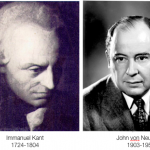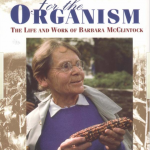History
I've sort of alluded to it, but grant fever took over the last couple of days as the deadline approaches. Unfortunately, it happened right around the time when the GMC ruling on Andrew Wakefield came down and came down hard on him and his unethical behavior. Oh, well, as they say, it looks like I picked the wrong week to stop sniffing glue. In any case, I doubt I'll get to Wakers before Monday, if then, given that there might be other things that catch my interest by then. In the meantime, as I recover from pulling a couple of near all-nighters in a row, check out this Classic Insolence from…
Goldberg shown here (right) "gangbanging" with a guy who enjoys making fun of the dead.I must have done something very, very wrong. Jonah Goldberg, that noxious, infected man-tit of a human being, has just praised my work at the National Review. Referring to my series on Deconstructing Social Darwinism Goldberg writes:
This is a very comprehensive assault on the prevailing understanding of "social Darwinism." Eric Michael Johnson's essay is a bit too rambling at times, but it is very welcome and good reading nonetheless.
Readers of my…
As part of the reading course I've set myself on Bronze Age sacrificial finds, wetland archaeology and landscape studies, I'm reading a new book whose title translates as "Swedish bog cultivation. Agriculture, peat use and landscape change from 1750 to 2000". It's about various ways that Swedes have tried to make use of wetland in the past centuries. The sites I'm studying are mostly in wetlands, and mostly they have been identified when finds have surfaced during the kind of projects the book covers. Its main focus is on the Swedish Bog Cultivation Society, that operated from 1886 to 1939.…
As reported this evening in the Boston Globe, the internationally renowned historian and bestselling author of A People's History of the United States died today while traveling in California.
For Dr. Zinn, activism was a natural extension of the revisionist brand of history he taught. Dr. Zinn's best-known book, A People's History of the United States (1980), had for its heroes not the Founding Fathers -- many of them slaveholders and deeply attached to the status quo, as Dr. Zinn was quick to point out -- but rather the farmers of Shays' Rebellion and the union organizers of the 1930s.
I…
One of the more substantive consequences of the powerful new genomic techniques has been in the area of ancient DNA extraction and analysis. The Neandertal genome story is arguably the sexiest, but closer to the present day there've been plenty of results which have changed the way we look at the past. The input of genetics has basically demanded a revision of the contemporary consensus of the origins of the Etruscans which emerged from archaeology. Though certainly ancestry and genetic relationship are informative, ancient DNA has also given us windows into the change of function and a…
Changes in human diet driven by cultural evolution seem to be at the root of many relatively recently emerged patterns of genetic variation. In particular, lactase persistence and varied production of amylase are two well known cases. Both of these new evolutionary genetic developments are responses to the shift toward carbohydrates over the last 10,000 years as mainstays of caloric intake. Rice and wheat serve as the foundations of much of human civilization. It is notable that both China and India are divided into rice and wheat (or millet) belts, so essential are modes of agriculture in…
A western Eurasian male is found in 2000-year-old elite Xiongnu cemetery in Northeast Mongolia:
We analyzed mitochondrial DNA (mtDNA), Y-chromosome single nucleotide polymorphisms (Y-SNP), and autosomal short tandem repeats (STR) of three skeletons found in a 2,000-year-old Xiongnu elite cemetery in Duurlig Nars of Northeast Mongolia. This study is one of the first reports of the detailed genetic analysis of ancient human remains using the three types of genetic markers. The DNA analyses revealed that one subject was an ancient male skeleton with maternal U2e1 and paternal R1a1 haplogroups.…
This is the brief presentation I gave on Saturday, Jan. 16 as part of this year's ScienceOnline conference. I was thrilled to have PZ Myers, Greg Laden and Janet Stemwedel present (the latter of whom posted her thoughts on the session).
John McKay and I led a discussion on the intersection between open access and scientific innovation. See the program description here and these posts for more information. In John's section he emphasized how the early history of scientific publishing was one where individual researchers simply pooled their letters into journals and shared them with one…
Modern day biological engineering and artificial life research focuses on the microscopic, the molecular, the informational, the stuff of the scientific revolutions of the past one hundred years. Our current synthetic biologies aim to turn the living into the designed, the wet into the computational, the complex into the understandable. In the 1700's, the interplay between the living and the mechanical was reversed; engineers were trying to make machines look and feel more like living things--soft, flexible, moist. Studying these historical artificial life technologies provide a valuable…
For the past few decades there has been a long standing debate as to the origins of modern Europeans. The two alternative hypotheses are:
* Europeans are descended from Middle Eastern farmers, who brought their Neolithic cultural toolkit less than 10,000 years ago.
* Europeans are descended from Paleolithic hunter-gatherers, who acculturated to the farming way of life through diffusion of ideas.
The two extreme positions are not really accepted in such stark forms by anyone. Rather, the debate is over the effect size of #1 vs. #2. Bryan Sykes, a geneticist at Oxford, has been arguing for the…
Many synthetic biologists cite one of Richard Feynman's many famous quotations as the inspiration for their work: "What I cannot create I do not understand." For synthetic biology the interpretation is clear--only by designing and building living systems will we truly understand the principles underlying the functions of living cells.
This connection between knowing and making that defines much of synthetic biology research today is, however, a much older idea, rooted in the philosophy of the enlightenment and centuries of western science. The 18th century philosopher Giambattista Vico said…
From "Lesser Known Wise and Prophetic Words of Rev. Martin Luther King, Jr." by liberal writer and California Democratic Party delegate, Deborah White:
"Science investigates; religion interprets. Science gives man knowledge which is power; religion gives man wisdom which is control. Science deals mainly with facts; religion deals mainly with values.
The two are not rivals. They are complementary.
Science keeps religion from sinking into the valley of crippling irrationalism and paralyzing obscurantism. Religion prevents science from falling into the marsh of obsolete materialism and moral…
tags: I Have a Dream, Martin Luther King, Jr., MLK, politics, civil rights, history, United States, streaming video
If you live in the USA, then you should know that today is Martin Luther King, Jr. Day. This is my favorite holiday in the States because it celebrates values instead of gross consumerism. It celebrates America's core values of human/civil rights as well as freedom for all (not just for the rich, as is the case now).
Martin Luther King, Jr.
I Have a Dream
August 28, 1963 at the Lincoln Memorial, Washington D.C.
[Transcribed from the video]
I am happy to join with you today in…
Awful Library Books has a post on books about genetic engineering from the 1970's and 80's, saying that it's time to get rid of them because "Genetic information is dramatically different from what we knew in the 70's and 80's. No mention of Human Genome Project or Dolly, the sheep." If you're looking for information about cutting-edge genetic engineering you're probably better off not looking for a book at all, but while science is inherently focused on the future, a historical perspective is almost always valuable, especially when it comes to genetic engineering and synthetic biology.
The…
Part 1 / Part 2 / Part 3 / Part 4
Richard Hofstadter wrote in Social Darwinism in American Thought that this political theory was "one of the leading strains in American conservative thought for more than a generation." In this series I have shown many of the inconsistencies that exist in the literature on social Darwinism and have emphasized the main objections that scholars have raised about the utility of the term.
In Part 1 I presented the standard definition of social Darwinism as defined by Richard Hofstadter and R.J. Halliday. In Part 2 I highlighted the common objection that there…
On The Primate Diaries, Eric Michael Johnson deconstructs "social Darwinism" in order to "raise some questions about the usefulness of [the term] and the way it has been applied." The concept has little to do with Charles Darwin, but it has often been misapplied to his idea of natural selection. Instead, social Darwinism springs from the sociology of Herbert Spencer, the man who coined the term "survival of the fittest" and believed the poor should be left alone and not aided by the government. From there, things get even murkier--in the 20th century the term "social Darwinist" was applied…
Scientific innovation relies on open communication and always has. It has only been through the free exchange of information and ideas that scientific pioneers have expanded the boundaries of knowledge. Through books, pamphlets, letters, journals, and now blogs, scientists communicate their results and imagine new frontiers in the natural world. But even as we reach our highest point of scientific achievement have we failed to learn the lessons that history teaches?
The barriers to science have always come in the form of restricting information. Figures such as Copernicus, Kepler,…
My first exposure to programming was as a nerdy elementary schooler playing with Logo, a simple computer language written for educational use as a way to teach basic concepts in programming and computer science. The language controls the behavior of the "turtle," a triangular cursor in the middle of the screen that can be programmed to move around and draw lines.
In one of the kid's versions I remember that the cursor even looked like a little turtle on the screen, not just a triangle. As you probably could tell, I'm fascinated by how computer scientists use language from living things and…
Eric Michael Johnson has put up a three part series on deconstructing the intellectual tradition of Social Darwinism. This is blogging as scholarship at its best. When it comes to intellectual history it is often rather easy to quote a particular passage or emphasize one aspect of a movement, and then leverage that in the furtherance of your argument. From what I can gather Eric seems to present "Social Darwinism" as a sloppy and incoherent set of ideas, more often attaining coherency in the reformulations of its antagonists than in consistency of vision set forth by its presumed luminaries.…
I just finished reading Evelyn Fox Keller's wonderful biography of Barbara McClintock, A Feeling for the Organism. Barbara McClintock was probably the best corn geneticist of all time and definitely one of the sassiest female scientists ever. In the 1940s and 1950s she discovered transposition, the process by which pieces of genes can literally jump out of one part of the chromosome and land back in another part. These jumping elements are controlled by master regulating elements in other parts of the genome and can turn different genes on and off at different times. This incredible discovery…




